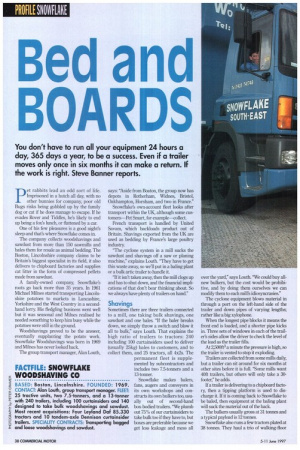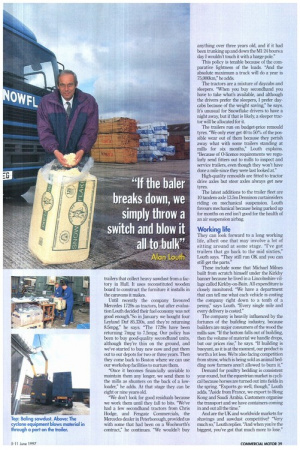Bed and
Page 40

Page 41

If you've noticed an error in this article please click here to report it so we can fix it.
BOARDS
You don't have to run all your equipment 24 hours a day, 365 days a year, to be a success. Even if a trailer moves only once in six months it can make a return. If the work is right. Steve Banner reports.
pet rabbits lead an odd sort of life. Imprisoned in a hutch all day, with no other bunnies for company, poor old Bugs risks being gobbled up by the family dog or cat if he does manage to escape. If he evades Rover and `Piddles, he's likely to end up being a fox's lunch, or flattened by a car.
One of his few pleasures is a good night's sleep-and that's where Snowflake comes in.
The company collects woodshavings and sawdust from more than 150 sawmills and bales them for resale as animal bedding. The Boston, Lincolnshire company claims to be Britain's biggest specialist in its field, it also delivers to chipboard factories and supplies cat litter in the form of compressed pellets made from sawdust.
A family-owned company, Snowflake's roots go back more than 35 years. In 1%1 Michael Milnes started transporting Lincolnshire potatoes to markets in Lancashire, Yorkshire and the West Country in a secondhand lorry. His fledgling business went well but it was seasonal and Milnes realised he needed something to keep him busy while the potatoes were still in the ground.
Woodshavings proved to be the answer, eventually supplanting the potato work. Snowflake Woodshavings was born in 1969 and Milnes has never looked back.
The group transport manager, Alan Louth, says: "Aside from Boston, the group now has depots in Rotherham, Widnes, Bristol, Oakhampton, Horsham, and two in France."
Snowflake's own-account fleet looks after transport within the UK, although some cus tomers—Pet Smart, for example collect.
French transport is handled by United Savarn, which backloads product out of Britain. Shavings exported from the UK are used as bedding by France's large poultry industry "The cyclone system in a mill sucks the sawdust and shavings off a saw or planing machine," explains Louth. "They have to get this waste away, so we'll put in a baling plant or a bulk artic trailer to handle it.
"If it isn't taken away, then the mill clogs up and has to shut down, and the financial implications of that don't bear thinking about. So we always have plenty of trailers on hand."
Shavings
Sometimes there are three trailers connected to a mill, one taking bulk shavings, one sawdust and one bales. "If the baler breaks down, we simply throw a switch and blow it all to bulk," says Louth. That explains the high ratio of trailers to tractors: 240 including 100 curtainsiders used to deliver (usually 25kg) bales to customers, and to collect them, and 25 tractors, all 4x2s. The permanent fleet is supplemented by subcontractors and includes two 7.5-tonners and a 13-tonner.
Snowflake makes balers, fans, augers and conveyors in its own workshops and constructs its own bulkers too, usually out of second-hand box-bodied trailers. "We plumb out 75% of our curtainsiders to take bulk too if they have to, but boxes are preferable because we get less leakage and mess all over the yard," says Louth. "We could buy allnew bulkers, but the cost would be prohibitive, and by doing them ourselves we can modify them to each mill's idiosyncrasies."
The cyclone equipment blows material in through a port on the left-hand side of the trailer and down pipes of varying lengths; rather like a big xylophone.
When the longest pipe blocks it means the front end is loaded, and a shorter pipe kicks in. Three sets of windows in each of the trailer's sides allow the driver to check the level of the load as the trailer fills.
At 2,500ft3 a minute the pressure is high, so the trailer is vented to stop it exploding.
Trailers are collected from some mills daily, but a trailer can sit around for six months at other sites before it is full. "Some mills want 4011 trailers, but others will only take a 30footer," he adds.
If a trailer is delivering to a chipboard factory, then a tipping platform is used to discharge it. If it is coming back to Snowflake to be baled, then equipment at the baling plant will suck the material out of the back.
The bulkers usually gross at 31 tonnes and a typical payload is 12 tonnes.
Snowflake also runs a few tractors plated at 38 tonnes. They haul a trio of walking-floor
trailers that collect heavy sawdust from a factory in Hull. It uses reconstituted wooden board to construct the furniture it installs in the caravans it makes.
Until recently the company favoured Mercedes 1729s as tractors, but after evaluation Louth decided their fuel economy was not good enough."So in January we bought four Leyland Daf 85.330s, and they're returning 8.5mpg," he says. "The 1729s have been returning 7mpg to 7.5mpg. Our policy has been to buy good-quality secondhand units, although they're thin on the ground, and we've started to buy new now and put them out to our depots for two or three years. Then they come back to Boston where we can use our workshop facilities to nurture them.
"Once it becomes financially unviable to maintain them any longer, we send them to the mills as shunters on the back of a lowloader," he adds. At that stage they can be eight or nine years old.
"We don't look for good residuals because we work them until they fall to bits. "We've had a few secondhand tractors from Chris Hodge, and Fengate Commercials, the Mercedes dealer in Peterborough, provided us with some that had been on a Woolworth's contract," he continues. "We wouldn't buy anything over three years old, and if it had been trunking up and down the M1 24 hours a day I wouldn't touch it with a barge pole."
This policy is tenable because of the comparative lightness of the loads. "And the absolute maximum a truck will do a year is 75,000km," he adds.
The tractors are a mixture of daycabs and sleepers. "When you buy secondhand you have to take what's available, and although the drivers prefer the sleepers, I prefer daycabs because of the weight saving," he says. It's unusual for Snowflake drivers to have a night away, but if that is likely, a sleeper tractor will be allocated for it.
The trailers run on budget-price remould tyres. "We only ever get 40 to 50% of the possible wear out of them because they perish away what with some trailers standing at mills for six months,' Louth explains. "Because of 0-licence requirements we regularly send fitters out to mills to inspect and service trailers, even though they won't have done a mile since they were last looked at."
High-quality remoulds are fitted to tractor drive axles but steer axles always get new tyres.
The latest additions to the trailer fleet are 10 tandem-axle 13.5m Dennison curtainsiders riding on mechanical suspension. Louth favours mechanical because being parked up for months on end isn't good for the health of an air suspension airbag.
Working life
They can look forward to a long working life, albeit one that may involve a lot of sitting around at some stage. "I've got trailers that go back to the mid sixties," Louth says. '`They still run OK and you can still get the parts."
These include some that Michael Milnes built from scratch himself under the Kirkby banner because he lived in a Lincolnshire village called Kirkby-on-Bain. All expenditure is closely monitored. "We have a department that can tell me what each vehicle is costing the company right down to a tenth of a penny," says Louth "Every single mile and every delivery is costed."
The company is heavily influenced by the fortunes of the building industry, becanse builders are major consumers of the wood the mills saw. "If the bottom falls out of building, then the volume of material we handle drops, but our prices rise," he says. "If building is buoyant, as it is at the moment, our product is worth a lot less. We're also facing competition from straw, which is being sold as animal bedding now farmers aren't allowed to burn it."
Demand for poultry bedding is consistent year-round, but the equestrian market is cyclical because horses are turned out into fields in the spring. "Exports go well, though," Louth adds. "Aside from France, we export to Hong Kong and Saudi Arabia. Customers organise the transport and we have containers coming in and out all the time."
And are the UK and worldwide markets for shavings and sawdust competitive? "Very much so," Louth replies. And when you're the biggest, you've got that much more to lose."




































































































